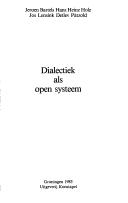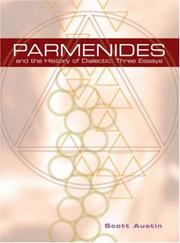| Listing 1 - 10 of 655 | << page >> |
Sort by
|
Book
ISBN: 1504494148 Year: 2023 Publisher: New York : IEEE,
Abstract | Keywords | Export | Availability | Bookmark
 Loading...
Loading...Choose an application
- Reference Manager
- EndNote
- RefWorks (Direct export to RefWorks)
Electronic devices that develop or utilize analog signals are not presently covered by standards. Interface connectivity of modern power-system signal transducers based on electronics, such as magneto-optic current transducers and electronic relays, are provided in this standard. The existing standardized levels from familiar magnetic current and voltage transformers are not readily generated by new types of electronic signal transducers.
Book
ISBN: 3110321289 9783110321289 9783110321012 3110321017 9783938793763 3938793767 3938793767 9783938793763 1299723896 Year: 2013 Publisher: Berlin Boston
Abstract | Keywords | Export | Availability | Bookmark
 Loading...
Loading...Choose an application
- Reference Manager
- EndNote
- RefWorks (Direct export to RefWorks)
Few ideas have played a more continuously prominent role throughout the history of philosophy than that of dialectic, which has figured on the philosophical agenda from the time of the Presocratics. The present book explores the philosophical promise of dialectic, especially in its dialogical version associated with disputation, debate, and rational controversy. The book's deliberations examine what lessons can be drawn to exhibit the utility of dialectical proceedings for the theory of knowledge in reminding us that the building-up of knowledge is an interpersonally interactive enterprise subject to communal standards.
Dialectic. --- Polarity --- Polarity (Philosophy)
Book
ISBN: 1108676251 1108681816 1108596789 1108471900 Year: 2019 Publisher: Cambridge : Cambridge University Press,
Abstract | Keywords | Export | Availability | Bookmark
 Loading...
Loading...Choose an application
- Reference Manager
- EndNote
- RefWorks (Direct export to RefWorks)
Ancient dialectic started as an art of refutation and evolved into a science akin to our logic, grammar and linguistics. Scholars of ancient philosophy have traditionally focused on Plato's and Aristotle's dialectic without paying much attention to the diverse conceptions and uses of dialectic presented by philosophers after the classical period. To bridge this gap, this volume aims at a comprehensive understanding of the competing Hellenistic and Imperial definitions of dialectic and their connections with those of the classical period. It starts from the Megaric school of the fourth century BCE and the early Peripatetics, via Epicurus, the Stoics, the Academic sceptics and Cicero, to Sextus Empiricus and Galen in the second century CE. The philosophical foundations and various uses of dialectic are closely analysed and systematically examined together with the numerous objections that were raised against them.
Dialectic. --- Polarity --- Polarity (Philosophy)

ISBN: 2711608689 9782711608683 Year: 1984 Volume: 47 Publisher: Paris Vrin
Abstract | Keywords | Export | Availability | Bookmark
 Loading...
Loading...Choose an application
- Reference Manager
- EndNote
- RefWorks (Direct export to RefWorks)
Polarity (Philosophy) --- Dialectic --- Philosophy --- Polarity --- Polarity (Philosophy).
Book
Year: 1968 Volume: Bd. 36 Publisher: Zürich : Rhein-Verlag,
Abstract | Keywords | Export | Availability | Bookmark
 Loading...
Loading...Choose an application
- Reference Manager
- EndNote
- RefWorks (Direct export to RefWorks)
Book
ISBN: 9783518585573 3518585576 Year: 2010 Volume: 2 Publisher: Berlin Suhrkamp
Abstract | Keywords | Export | Availability | Bookmark
 Loading...
Loading...Choose an application
- Reference Manager
- EndNote
- RefWorks (Direct export to RefWorks)
Logic --- Dialectic --- Polarity --- Polarity (Philosophy)

ISBN: 9062930220 Year: 1985 Publisher: Groningen Konstapel
Abstract | Keywords | Export | Availability | Bookmark
 Loading...
Loading...Choose an application
- Reference Manager
- EndNote
- RefWorks (Direct export to RefWorks)
Dialectic --- #gsdbf --- Polarity --- Polarity (Philosophy) --- Dialectic.

ISBN: 1282256122 9786612256127 1930972539 9781930972537 9781282256125 9781930972193 1930972199 6612256125 Year: 2007 Publisher: Las Vegas [Nev.] : Parmenides Pub.,
Abstract | Keywords | Export | Availability | Bookmark
 Loading...
Loading...Choose an application
- Reference Manager
- EndNote
- RefWorks (Direct export to RefWorks)
Dialectic. --- Polarity --- Polarity (Philosophy) --- Parmenides. --- Dialectique
Book
ISBN: 1003384250 1000953262 1032470216 1000953327 Year: 2023 Publisher: Milton : Taylor & Francis Group,
Abstract | Keywords | Export | Availability | Bookmark
 Loading...
Loading...Choose an application
- Reference Manager
- EndNote
- RefWorks (Direct export to RefWorks)
"Drawing upon a wide variety of authors, approaches, and ideological contexts, this book offers a comprehensive and detailed critique of the distinct and polemical senses in which the concept of ressentiment (and its cognate 'resentment') is used today. It also proposes a new mode of addressing ressentiment in which critique and polemics no longer set the tone. Contemporary tendencies in political culture such as neoliberalism, nationalism, populism,identity politics, and large-scale conspiracy theories have led to the return of the concept of ressentiment in armchair political analysis. This book argues that, due to the tension between its enormous descriptive power and its mutually contradicting ideological performances, it is necessary to 'redramatize' the concept of ressentiment. Inspired by Marxist political epistemology, affect theory, postcolonialism, and feminism, the book maps, delimits, and assesses four irreducible ways in which ressentiment can be articulated: the ways of the priest, the philosopher, the witness, and the diplomat. The first perspective is typically embodied by conservative (Scheler, Girard) and liberal (Smith, Rawls) political theory, the second by Nietzsche, Deleuze and Foucault, whereas the third is found in the writings of Améry, Fanon and Adorno, and the fourth is the author's own, albeit inspired by philosophers such as Ahmed, Stiegler, Stengers and Sloterdijk. In producing a dialectical sequence between all four typical modes of enunciation, the book seeks to answer the question by what right do we possess and use the concept of ressentiment, and what makes the phenomenon worth knowing? The Dialectic of Ressentiment will be of interest to scholars and advanced students working in critical theory, social and political philosophy, cultural studies, sociology, history, literature, and anthropology. It will also appeal to anyone interested in (public debates on) the politics of anger, discourse ethics, trauma studies, and memory politics"--
Resentment --- Dialectic. --- Philosophy. --- Polarity --- Polarity (Philosophy) --- Emotions
Book
Year: 1963 Publisher: New York : Braziller,
Abstract | Keywords | Export | Availability | Bookmark
 Loading...
Loading...Choose an application
- Reference Manager
- EndNote
- RefWorks (Direct export to RefWorks)
| Listing 1 - 10 of 655 | << page >> |
Sort by
|

 Search
Search Feedback
Feedback About UniCat
About UniCat  Help
Help News
News